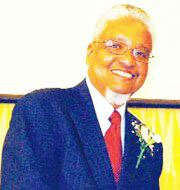– UWI VC tells law symposium
Professor Nigel Harris, Vice Chancellor of the University of the West Indies, told a high-level law symposium in Trinidad and Tobago recently that steps to promote a sense of regionalism and a wish for integration will not succeed without participants seeing the profound value in becoming one entity.

The UWI Vice Chancellor in remarks at the opening ceremony of the three-day Caribbean Law Institute Symposium on ‘Current Developments in Caribbean Law’ at the Hyatt Regency Hotel in Port-of-Spain, advised that “We must continually seek ways to demonstrate to our larger community of nations that there is incremental value that accrues to the whole as opposed to its many parts.”
He also underscored that the thrust of the symposium was the Caricom Single Market and Economy (CSME) and the exploration of how the Community would establish and implement its legal, political and economic framework to promote regional integration “even at a time of economic disruption and local financial crisis,” according to a press release from the Caricom Secretariat, Turkeyen.
“My hope and expectation is that this conference will realise the objectives the organizers have set. Our central role must continue to be one of forging a more integrated region even as we help energise and contribute to its sustainable development,” Professor Harris was quoted as telling the symposium.
Among those in the audience were Caricom Secretary General and Conference Chairman Edwin Carrington, Barbados Prime Minister David Thompson, President of the Caribbean Court of Justice, Justice Michael de la Bastide, Ambassador Dr Cuthbert Joseph who represented Trinidad and Tobago Prime Minister Patrick Manning,Professor Winston Anderson, members of the Judiciary and legal fraternity and members of the Diplomatic Corps.
Professor Harris also drew attention to what he described as “growing concern in some quarters” that the UWI is “losing its regional character and that it may not be the force for regional integration that it once was.”
In truth, he acknowledged, those critics are often hearkening back to the days when all West Indian students went to the Mona Campus and were imbued with a profound sense of their Caribbean identity based on their interaction with fellow students and staff drawn from all parts of the West Indies.
However, Professor Harris noted that “times have evolved and higher education can no longer be the province of a select elite, able to be cloistered in one single place of excellence in the Caribbean.”
In today’s world, leaders of all Caricom countries know that knowledge capacity and innovation are the essential currencies of development, and access to high quality tertiary education has to be expanded in their own countries to enable greater competitiveness and sustainability, the UWI Vice- Chancellor noted.
It is in this context, he continued, that in the early 1960s campuses were also established at Cave Hill and St Augustine and it is in this context that the OECS and other West Indian countries are seeking to establish university presences on their own soil.
Professor Harris contended that “Our challenge is to determine how the UWI can enhance that sense of regional purpose and bring broad value to the Caricom Community and individual nations.”
He then observed that the older campuses, Mona, St Augustine and Cave Hill, each have several thousand students and the hope is that the newer Open Campus will also recruit several more thousands, particularly from those UWI contributing countries without campuses.
He also observed that in framing a regional Strategic Plan 2007-2012, which involved stakeholders from within and without the University across the entire Caribbean, they had designed and implemented several measures to enhance cross-campus collaboration in teaching, research, and outreach.
“We have also introduced programmes for individuals and groups of students to move to other campuses for periods of one week to one year through sports competitions, field trips and provision of scholarships to study at another campus,” the UWI Vice Chancellor pointed out.
In addition, he said that they are also promoting the sharing of teaching across campuses either by academics travelling physically or by utilising internet and videoconferencing facilities.
“We have embarked too, on making all our sites in all 15 contributing countries scattered across the Caribbean Sea, part of a single, seamless, ICT network,” Professor Harris added.